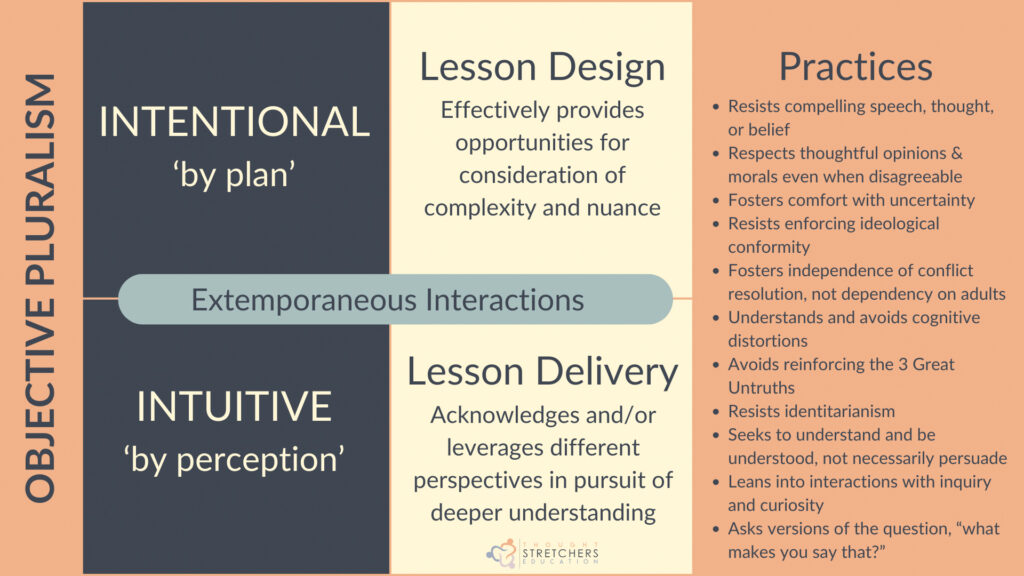Polarizing Culture-War Issues

It’s no secret that toxic polarization is encroaching on our K–12 education spaces. News and social media are increasingly populated with stories from boardrooms to classrooms where tempers are flaring and rhetoric is heated. Secondary school principals are uniquely positioned to receive pressure from any and all stakeholders in their school’s ecosystem but also have an opportunity to lead their communities in transcending these corrosive elements. Here are four ways secondary school principals can navigate polarizing culture-war issues that have become increasingly likely to tear their communities apart.
1. Use Objective Pluralism to “Teach the Truth.”
Objective Pluralism is an approach to teaching and learning that leans into liberal principles from the Enlightenment and that undergird America’s democracy (and Western democracies). Pluralism promotes the idea that diversity is not only inevitable but also valuable, contributing to a richer and more dynamic community. The goal of pluralism is often to foster tolerance, understanding, and cooperation among different groups, facilitating peaceful coexistence despite differences. In a pluralistic society, different individuals and groups can maintain their distinct identities and contribute to the overall social fabric.
Being objective means approaching a situation, issue, or information without being unduly influenced by personal feelings, biases, or opinions. It involves the ability to set them aside, and then analyze and evaluate them based on evidence.
In various contexts, objectivity can be crucial. For example, in journalism, reporters—not to be confused with opinion journalists—often strive to present news stories objectively, providing an unbiased account of events. In scientific research, objectivity is essential to maintain the integrity of experiments and draw accurate conclusions so scientists can follow the evidence regardless of how it might conflict with their desired outcomes.
Of course, achieving complete objectivity can be challenging, as individuals may carry unconscious biases or be influenced by personal experiences. Regardless, the pursuit of objectivity involves working to consciously minimize these influences and prioritizing a rational and evidence-based approach.
Objective Pluralism then, in the context of teaching and learning, is an approach that recognizes the existence and value of a variety of viewpoints, perspectives, ideas, and opinions but also acknowledges and advocates for accepted knowledge and truth as determined through the principles of Enlightenment liberalism.
When engaging in planning, teaching, and curriculum design, educators should be cognizant of the intentional and intuitive components. The former involves the specific planning and lesson design steps to be built into teaching and learning. The latter involves the teachable moments that arise from effective intentional lesson design. By leveraging their perception, educators can reinforce and model the core rules and practices in their lesson delivery. This approach is consistent with the knowledge-rich inquiry teaching approach that helps teachers build surface, deep, and transfer learning.

2. Educate your school community on the two core rules and 10 commitments of Enlightenment liberalism.
For the points on Enlightenment liberalism and free thought that I make here and in Number 3, I’ve drawn from Jonathan Rauch’s book, The Constitution of Knowledge: A Defense of Truth. As Rauch makes clear, one purpose of K–12 education in the United States is to support our democracy by graduating productive and civically engaged students. Through my work with schools to help them navigate cultural polarization, it has become clear most educators and stakeholders are only vaguely familiar with the concepts of Enlightenment liberalism (not to be confused with liberal as commonly used when referring to the Democratic party or the partisan left). Why would they be? They’re busy living their lives and doing their jobs. But when we present these concepts in our Objective Pluralism workshops, they resonate with most people because they recognize them as necessary to foster a functioning democracy and reality-based community.
Enlightenment liberalism is guided by these two core rules:
1. The fallibilist rule: No one gets the final say. You may claim that a statement is established as knowledge only if it can be debunked, in principle, and only insofar as it withstands attempts to debunk it.
2. The empirical rule: No one has personal authority. You may claim that a statement has been established as knowledge only insofar as the method to check it gives the same result regardless of the identity of the checker, and regardless of the source of the statement.
And these 10 commitments:
1. Fallibilism: The ethos that any of us might be wrong thus we strive to keep our ideas open to criticism.
2. Objectivity: Understanding that truth is not based on feeling, identity, or a person’s/group’s lived experience.
3. Exclusivity: A commitment to the idea of objective reality because what lies beyond that is chaos.
4. Disconfirmation: A commitment that all ideas and viewpoints are subject to challenge by the community.
5. Accountability: A commitment to offering our ideas for critique in good faith and acknowledging when we’re wrong.
6. Pluralism: Valuing viewpoint diversity and a commitment to encourage and seek it out.
7. Civility: A commitment to discourage and avoid personal attacks and, instead, depersonalize rhetoric.
8. Professionalism: A commitment to valuing the credentials and reputations of this reality-based community.
9. Institutionalism: A commitment to valuing and relying upon established norms and codes of conduct.
10. No BS’ing: A commitment to sincerely regard the truth instead of obscuring it.
3. Help teachers and students understand the three challenges to free thought.
The First Amendment to our Constitution protects our freedom of speech and expression and while laws and policies are necessary, they are not sufficient. Forces from both the left and the right engage in illiberal activism and actions meant to control thought and expression. Our schools should be a significant part of reinforcing the culture necessary to resist those forces.
While these three challenges to free expression can be emotionally seductive, teachers and students should understand how they actually undermine social progress by limiting speech and expression that helps us correct injustices.
1. The Fundamentalist Threat: The idea that we (or I) know what the truth is so we don’t need to take seriously anyone who disagrees. Why would we allow untruths to be propagated in the world?
2. The Egalitarian Threat: Grounded in fairness, the idea that everyone should be treated equally so whatever anyone thinks can be true because, after all, we all have different points of view. Or that the beliefs of persons in historically oppressed classes or groups should be prioritized.
3. The Humanitarian Threat: Grounded in harm, the claim that someone else’s ideas can hurt me or my group in a way that is akin to violence so expressing them or tolerating them violates my human rights.
4. Actively work with students to dispel the following “three great untruths” as identified by Jonathan Haidt and Greg Lukianoff in their book, The Coddling of the American Mind: How Good Intentions and Bad Ideas Are Setting Up a Generation for Failure.
1. What doesn’t kill you makes you weaker.
- We want our students to be “anti-fragile,” as Haidt says, and to understand that they can do hard things and will grow by doing them.
2. Always trust your feelings.
- We want our students to be careful not to act or react impulsively based on their emotional interpretations of events but to question those feelings and lean into rational decision-making.
3. Life is a battle between good people and evil people.
- We want our students to resist the kind of black-and-white thinking tribalism that creates the dangerous and destructive us-versus-them dynamic we’re all familiar with. Prioritizing group identity reinforces polarization and we want our students to recognize and value the complexity and nuance of every individual.
As social psychologist Jonathan Haidt says, “Children are anti-fragile, we are all prone to motivated reasoning and confirmation bias, and we’re all prone to tribalism and black-and-white thinking. If we want to raise a generation of kids who can deal with diversity of all kinds, who can go out into a world that’s physically actually quite safe and yet full of offensive content, we need to get our educational practices in line with these three psychological principles.” Growing emotionally healthy students requires building resiliency that empowers them to encounter different or disagreeable ideas with the same sense of curiosity and tolerance we should expect of adults.
Most of your community is likely motivated to move beyond the us-versus-them mindset, but it will take leadership to galvanize positive collective action.
K–12 education is clearly at the center of our polarized, increasingly toxic, culture wars. Leaning into the Enlightenment liberal principles that undergird our democracy and moving away from the illiberal authoritarianism encroaching from both left and right can help your school community move toward a healthier culture where students and adults can focus on teaching and learning. Most of your community is likely motivated to move beyond the us-versus-them mindset, but it will take leadership to galvanize positive collective action.
Developing a better understanding of Objective Pluralism and using it as part of a knowledge-rich inquiry teaching approach helps prepare educators to engage learners in ways that grow surface, deep, and transfer learning while modeling and instilling the Enlightenment liberal principles that foster productive dialogue and navigation of conflict.
To that end, teaching must honor and recognize the incredible diversity of the human experience and discard the dogma and orthodoxy that many feel compelled to engage in because they feel they must pick a side. We can acknowledge the complexity and nuance of contentious topics and allow for a plurality of perspectives while not letting go of accepted truth. Doing so will feel like a breath of fresh air for your school community and empower you to better prepare students for the modern world.
Drew Perkins is the director of ThoughtStretchers Education, which designs and delivers professional development to help educators better prepare students for the modern world through the lens of inquiry. He also hosts “The ThoughtStretechers Education Podcast.” Learn more at wegrowteachers.com.
References
Perkins, D. (2024, January 27). Want to teach the truth? Use objective pluralism. ThoughtStretchers Education. wegrowteachers.com/teach-the-truth-objective-pluralism
Pomeroy, R. (2023, February 9). 3 great untruths to stop telling our kids–and ourselves. Big Think. bigthink.com/thinking/untruths-to-stop-telling-kids
